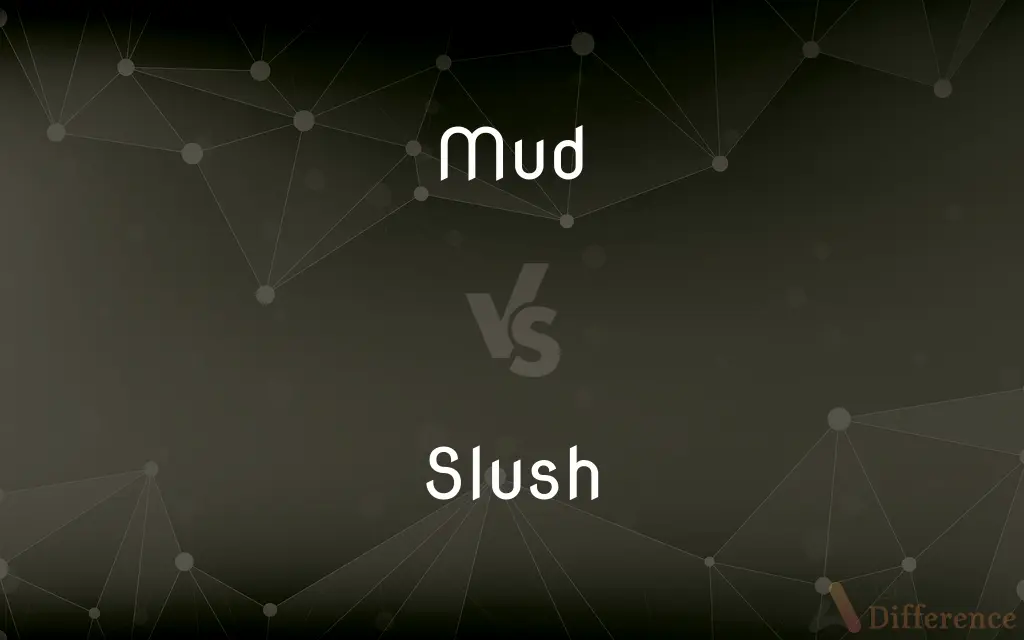Mud vs. Slush — What's the Difference?
Edited by Tayyaba Rehman — By Fiza Rafique — Updated on April 29, 2024
Mud is a mixture of water and soil, earthy and thick, often sticky, while slush is partially melted snow or ice, wet and slushy.

Difference Between Mud and Slush
Table of Contents
ADVERTISEMENT
Key Differences
Mud is formed when water mixes with soil, silt, or clay, resulting in a thick, sticky substance often found on the ground after rain. Whereas, slush refers to snow that has partially melted and mixed with water, creating a more fluid, semi-solid consistency.
Mud is typically associated with the rainy seasons and wetlands, providing a habitat for various organisms and playing a crucial role in ecosystems. On the other hand, slush commonly appears in colder climates during the transition between winter and spring or during warm spells in winter.
While mud can be beneficial for agriculture by retaining moisture in soil, slush often poses hazards in urban and suburban environments, leading to slippery conditions and impeding transportation.
While mud is used creatively in certain cultures for construction and art (like adobe or cob), slush is primarily viewed as a nuisance, especially in urban settings where it dirties streets and sidewalks.
Mud has a denser, more cohesive structure, supporting growth and construction, whereas slush is less stable and more transient in nature.
ADVERTISEMENT
Comparison Chart
Composition
Water mixed with soil, silt, or clay
Partially melted snow and water
Consistency
Thick, sticky, and dense
Watery, loose, and less cohesive
Common Locations
Wetlands, agricultural fields, rainy areas
Cold regions, streets in winter
Seasonal Appearance
Common during rainy seasons
Appears in winter and during thaws
Uses and Perceptions
Beneficial for growth, used in construction
Often seen as a nuisance, impedes travel
Compare with Definitions
Mud
Wet, soft earth consisting of soil and water.
He slipped in the mud while hiking.
Slush
Can make driving hazardous.
The road was slippery because of the slush.
Mud
Can be therapeutic in spa treatments.
Mud baths are popular for their health benefits.
Slush
Typical during transitional weather in winter.
The slush formed as temperatures rose above freezing.
Mud
Supports agricultural growth by retaining moisture.
The mud in the fields helps nourish the crops.
Slush
Semi-liquid mixture of water and partially melted snow.
The streets were covered in slush after the snowstorm.
Mud
Often associated with messy outdoor activities.
They played football in the mud.
Slush
Often cleared from pathways and roads.
Workers shoveled the slush to clear the sidewalk.
Mud
Used for building materials in certain cultures.
Houses made of mud bricks are common in the region.
Slush
Considered unpleasant in urban environments.
Walking through the slush soaked my shoes.
Mud
Mud is soil, loam, silt or clay mixed with water. It usually forms after rainfall or near water sources.
Slush
Slush, also called slush ice, is a slurry mixture of small ice crystals (e.g., snow) and liquid water.In the natural environment, slush forms when ice or snow melts. This often mixes with dirt and other materials, resulting in a gray or muddy brown color.
Mud
A computer-based text or virtual reality game which several players play at the same time, interacting with each other as well as with characters controlled by the computer.
Slush
Partially melted snow or ice
The snow was turning into brown slush in the gutters
Mud
A computer program, usually running over the internet, that allows multiple users to participate in virtual-reality role-playing games.
Slush
Excessive sentiment
The slush of Hollywood's romantic fifties films
Mud
Wet, sticky, soft earth, as on the banks of a river.
Slush
Make a squelching or splashing sound
There was water slushing around in the galley
Mud
(Slang) Wet plaster, mortar, or cement.
Slush
Partially melted snow or ice.
Mud
Slanderous or defamatory charges or comments
Slinging mud at his opponent.
Slush
Soft mud; slop; mire.
Mud
To cover or spatter with or as if with mud.
Slush
(Nautical) Grease or fat discarded from a ship's galley.
Mud
A mixture of water and soil or fine grained sediment.
Slush
A greasy compound used as a lubricant for machinery.
Mud
A plaster-like mixture used to texture or smooth drywall.
Slush
Maudlin speech or writing; sentimental drivel.
Mud
(construction industry slang) Wet concrete as it is being mixed, delivered and poured.
Slush
A drink made of flavored syrup poured over crushed ice.
Mud
(figuratively) Willfully abusive, even slanderous remarks or claims, notably between political opponents.
The campaign issues got lost in all the mud from both parties.
Slush
(Informal) Unsolicited manuscripts submitted to a publisher.
Mud
(slang) Money, dough, especially when proceeding from dirty business.
Slush
To daub (machinery) with slush.
Mud
(geology) A particle less than 62.5 microns in diameter, following the Wentworth scale
Slush
To fill (joints in masonry) with mortar.
Mud
A black person.
Slush
(Nautical) To wash down (a deck) by splashing with water.
Mud
Drilling fluid.
Slush
To splash or soak with slush or mud.
Mud
(slang) Coffee.
Slush
To walk or proceed through slush.
Mud
(transitive) To make muddy or dirty; to apply mud to (something).
Slush
To make a splashing or slushy sound.
Mud
(transitive) To make turbid.
Slush
Half-melted snow or ice, generally located on the ground.
As the skiing season drew to an end, there was nothing but slush left on the piste.
Mud
(intransitive) To go under the mud, as an eel does.
Slush
Liquid mud or mire.
Mud
To participate in a MUD or multi-user dungeon.
Slush
Flavored shaved ice served as a drink.
Mud
Earth and water mixed so as to be soft and adhesive.
Slush
A soft mixture of grease and other materials, used for lubrication.
Mud
To bury in mud.
Slush
The refuse grease and fat collected in cooking, especially on shipboard.
Mud
To make muddy or turbid.
Slush
(engineering) A mixture of white lead and lime, used as a paint to prevent oxidation.
Mud
Water soaked soil; soft wet earth
Slush
(publishing) Unsolicited manuscripts, as in slush pile.
Mud
Slanderous remarks or charges
Slush
To smear with slushy liquid or grease.
Mud
Soil with mud, muck, or mire;
The child mucked up his shirt while playing ball in the garden
Slush
To slosh or splash; to move as, or through, a slushy or liquid substance.
Mud
Plaster with mud
Slush
To paint with a mixture of white lead and lime.
Slush
Soft mud.
Slush
A mixture of snow and water; half-melted snow.
Slush
A soft mixture of grease and other materials, used for lubrication.
Slush
The refuse grease and fat collected in cooking, especially on shipboard.
Slush
A mixture of white lead and lime, with which the bright parts of machines, such as the connecting rods of steamboats, are painted to be preserved from oxidation.
Slush
To smear with slush or grease; as, to slush a mast.
Slush
To paint with a mixture of white lead and lime.
Slush
Partially melted snow
Slush
Make a splashing sound;
Water was splashing on the floor
Slush
Spill or splash copiously or clumsily;
Slosh paint all over the walls
Common Curiosities
Can mud be beneficial?
Yes, mud can support agricultural growth and is used in eco-friendly construction.
What is the best way to deal with slush in public areas?
Clearing slush promptly from walkways and roads is essential to prevent accidents and ensure safe walking and driving conditions.
Why is slush problematic for transportation?
Slush can make roads and walkways slippery, increasing the risk of accidents.
Is there any way to prevent the formation of mud?
Effective drainage and careful water management can minimize unnecessary mud formation.
How should one prepare for slushy conditions?
Wearing waterproof footwear and using salt or sand on pathways can help manage slushy conditions.
What causes mud to form?
Mud forms when water mixes with soil, creating a thick, sticky mass.
How do mud and slush affect the environment differently?
Mud can enhance soil fertility and support ecosystems, while slush is mainly a transitional weather nuisance with few environmental benefits.
Are there any health risks associated with mud?
Poorly managed mud can harbor pathogens or parasites, potentially posing health risks.
Can mud be used in artistic creations?
Yes, mud is used in pottery, sculptures, and traditional mud paintings.
What tools are effective for removing slush?
Shovels and snow blowers are commonly used tools for removing slush efficiently.
How long does slush typically last?
Slush's duration depends on weather conditions; it may quickly refreeze or dry up as temperatures change.
Share Your Discovery

Previous Comparison
Sirrah vs. Sir
Next Comparison
Unpredicted vs. UnpredictableAuthor Spotlight
Written by
Fiza RafiqueFiza Rafique is a skilled content writer at AskDifference.com, where she meticulously refines and enhances written pieces. Drawing from her vast editorial expertise, Fiza ensures clarity, accuracy, and precision in every article. Passionate about language, she continually seeks to elevate the quality of content for readers worldwide.
Edited by
Tayyaba RehmanTayyaba Rehman is a distinguished writer, currently serving as a primary contributor to askdifference.com. As a researcher in semantics and etymology, Tayyaba's passion for the complexity of languages and their distinctions has found a perfect home on the platform. Tayyaba delves into the intricacies of language, distinguishing between commonly confused words and phrases, thereby providing clarity for readers worldwide.
















































